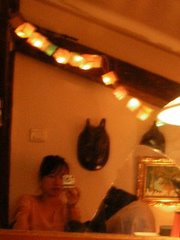
This month, Renlai/eRenlai focuses on family, education and more precisely, on fatherhood.
Here is a special thanks to two English teachers in Taipei: Natalia and Darren. The first helped me to record some of the kids she's teaching, the second kindly answered my questions... Listen to children words about their daddy and discover how Darren educates children with martial arts...
Or read my own reflection about fatherhood:
Fathers, where are you?
With the multiplication of single-parent families, it is more and more common to see children being raised by their mother. In fact, after a divorce or a separation, children are most of the time left to their mother’s care. Among my friends, I know only one who lived with her father instead of her mother after they got divorced. I was myself raised by my mother, only seeing my father from time to time. I think I got used to living with an absent father as well as most of my friends. That didn’t mean that they were not seeing their fathers or didn’t have a good relationship with them, it is just that the father could be less present without maybe disrupting drastically the run of events… It seems like the absence or the disinvolvement of fathers is a common representation of fatherhood.
Do fathers have a different linkage to their offspring than mothers? It is true that for biological evidences, the mother is more able to develop an intuitive relationship to her child. But for the father? As the father is first deprived from the feeling of osmosis felt by some women, how can he become “aware” of his fatherhood? How does the feeling of being a father grow and be nurtured inside him?
The mysterious link of fatherhood, and sometimes motherhood, is less obvious than what it would seem. In 2005, Belgian directors the Dardennes brothers, shot a movie entitled The Child where they try to capture this link, especially the one of fatherhood. Sonia and Bruno are twenty and they just come to have a child. They have no money, Bruno makes a living from small thieving and swindling. The beginning of the movie is already emblematical of the father’s absence: Sonia goes out of the maternity hospital holding her baby in her arms but Bruno is not there and she starts to look after him. Finally, when they meet, Jimmy, the baby, is a “strange thing” to Bruno who doesn’t show any special care or concern. At this stage of the movie, the main question that the directors also asked themselves was: would Sonia’s great love and affection be enough to make Bruno be aware of his son’s existence? And the answer was “no”. The movie reaches its acme when Bruno tells Sonia he has sold their 9 days-old child. Bruno then justifies himself by saying “We’ll make another one”, relegating his gesture to the most ordinary ones. To Bruno indeed, it doesn’t mean anything to have sold his own child as, to him, having a child didn’t mean anything more than having a baby carriage… The second part of the movie is dedicated to the redemption of Bruno to whom the buying back of the child is just the first step. And he actually has to save another boy in order to also achieve his own redemption.




